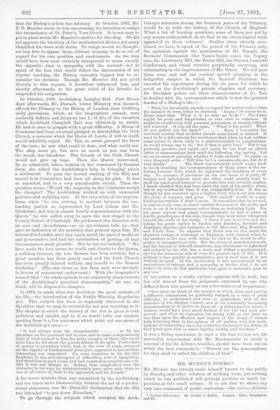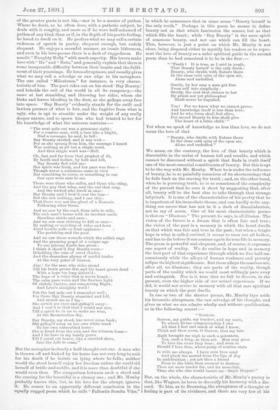MR. MUNBY'S POEMS.*
Mn. MUNDY has already made himself known to the public by Dorothy and other volumes of striking verse, yet nothing which he has published will perhaps produce so much im- pression as this small volume. It is not that he shows any very rare command of poetic expression,—the curiosa felicitcre Vestigia nevoraum. By Arthur J. Minty, London; Men,. Remington, and Clo. of the greater poets is not hie,—nor is he a master of pathos. Where he deals, as he often does, with a pathetic subject, he deals with it roughly, and more as if he were half-ashamed of pathos of any kind, than as if, in the depth of hie poetic feeling, he loved to dwell on it. He prefers what we may call a certain rudeness of speech in poetry, eloquent enough, but rudely eloquent. He enjoys a scornful manner, an ironic bitterness, and even in his love-poems there is a dash of ruggedness. He assails "Naughty Nelly "with much asperity. His lovers make love with" Ifs "and "Buts," and generally explain that there is some insuperable difficulty between their hearts and the fulfil- ment of their yearnings. He loves abruptness, and usually gives what we may call a selvedge or raw edge to his metaphors. The one called "Milestones," for instance, is very charac- teristic of him. The poet rides out on his steed' Bay Beauty,' and beholds the evil of the world in all its rampancy,—the mare at last stumbling and throwing her rider, whom she kicks and leaves bleeding in the dust, as she gallops away free into space. Bay Beauty' evidently stands for the swift and lawless pursuer of what is fair, and the fugitive from what is ugly, who is apt to stumble under the weight of any really deeper nature, and to spurn him who had trusted to her for his knowledge of what the universe contains :— "The next mile out was a gruesome sight ;
For a sombre man, with a face like a blight, Had a-message, he said, to tell :
Bay Beauty started, and it was well—
For as she sprang from him, the message I heard Was nothing at all but a single word, And that single word was—Hell.
Oh, fast and far from that prophet of ill, By heath and hollow, by holt and hill, Bay Beauty fled with me : Her spirit was fresh, and her pace was free— Though never a milestone came in view Bat something to scorn, or something to rue Our eyes were sure to see.
There were those who suffer, and those who sting, And the gay that wdep, and the sad that sing, And the wicked who dwell at ease:
Bay Beauty and I look'd over the leas— But she saw nothing, and I saw this: That there was not the ghost of a Nemesis Following after these.
And we saw by the road, from mile to mile, The rich man's house with its insolent smile Standing stable and sure :
And we saw men striving to kill or cure— By making or mending of rules and laws Amid hostile yells or fond applause—
The perishing and the poor.
And we saw those wounds which the selfish rage And the grasping greed of a vulgar age ' To our piteous Earth has given : I think it shock'd Bay Beauty even— Beholding the ruin of rural shades, And the shameless plying of sordid trades At the very gates of heaven.
Alas! for the man who rides ahead Till his brain grows dim and his heart grows dead With a hope too long deferr'd :
The hope of a voice that is never heard—
The calm pure voice and the flawless light Of stately Justice, and conquering Right, And Love's almighty word !
Put the last mile out I remember well; For there Bay Beauty stumbled and fell, And struck me as I lay :
She struck me once and gallop'd away— And I vow'd to God that I would not rise, Till a spirit be in me to make me wise.
At the Resurrection day.
Bay Beauty, my steed, has never come back; She gallop'd away on her own white track To her own untroubled home :
She is freed from the rein and the crimson foam— And I lie here in my lonely grave
Till I crawl out hence, like a startled slave, Into the Life to come."
But the metaphor is clearly a half-thought-out one. A man who is thrown off and kicked by his horse has not very long to.wait for his death if he insists on lying where he falls; neither would the steed herself enjoy her freedom unless she could rid
herself of bridle and saddle, and it is more than doubtful if she would even then. The comparison between such a steed and the craving for the beautiful is a clumsy one ; and Mr. Munby probably knows this, but, in his love for the abrupt, ignores it. He comes to an apparently different conclusion in the equally rugged poem which he calls " Fallentis Semita Vita," in which he announces that in some sense "Beauty herself is the only truth." Perhaps in this poem he means to define beauty not as that which fascinates the senses, but as that which fills the heart ; while Bay Beauty' is the mere spirit of sensuous beauty, and not one which can fill the heart. This, however, is just a point on which Mr. Munby is not clear, being disposed either to mystify his readers or to repre- sent the love of beauty as a safer spiritual guide in the second poem than he had conceived it to be in the first :—
" 'Truth P It is true, as I said in youth, That Beauty herself is the only truth : Beauty, who dwells with Nature there In the clear cold calm of the open air,
Alone and undefiled.
Surely, by her may a man get free From self into simplicity Surely, the soul that cleaves to her By priest nor yet philosopher Shall never be beguiled.
Yea! For we know what we cannot prove: And knowledge itself is less than love: And he who loves shall feel alive, For sacred Beauty to him shall give The heart of a little child.'" Yet when we speak of knowledge as less than love, we do not mean the love of that
"Beauty, who dwells with Nature thero In the clear cold calm of the open air, Alone and undefiled."
We mean, on the contrary, the love of that beauty which is discernible in the midst of human toil and trouble, and which
cannot be discerned without a spirit that finds in truth itself one of the most essential constituents of beauty. But this is apt to be the way with Mr. Munby. When he is under the influence of beauty, he is so painfully conscious of its shortcomings that he falls back on the craving for truth ; and, on the other hand, when he is pursuing truth, he is so conscious of the complexity of the pursuit that he cuts it short by suggesting that, after all, beauty will be the best clue to take through that strange labyrinth. It is one of the characteristics of his poetry that he is impatient of his immediate theme, and can. hardly write any- thing con amore that has not in it a dash of dissatisfaction,.
not to say of scorn. One of his most characteristic poems is that on "Illusions." The present, he says, is all illusion. The vision of the future is a dream that is often fair and true ; the vision of the past is a memory in which the heart dwells on that which was fair and true in the past ; but when a bright hope is what is called realised, it seems to turn out all hollow,
and has to die before it can assume again its true life in memory. The poem is powerful and eloquent, and, of course, it expresses one aspect of reality. We do realise in hope and in memory the best part of that experience through which we live half-un- consciously while the alloys of human weakness and poverty
eclipse its highest significance. But these alloys themselves are, after all, no illusions ; they are parts of the reality, though, parts of the reality which we would most willingly pare away and extinguish. Nor is it true that we fail to discern, in the present, even the higher side of our actual experience. If we did, it would not revive in memory with all that rare spiritual beauty on which the poet dwells.
In one or two of the shorter poems, Mr. Munby lays aside his favourite abruptness, the raw selvedge of his thought, and gives us what we can admire wholly and without qualification, as in.the following sonnet :— " Solinow.
Sorrow, ray guide, my teacher', and my mato, To whose divine companionship I owe
All that I feel and much of what I know, Think not thou scorn, 0 Sorrow, that my fate Hath brought me nigh to such a potentate, Yea, such a king, as thou art. Men may grow
To love the cross they bear ; and even so Should I love thee, whose pomp of sombre state
Is with me always. I have seen thee send And pluck his morsel from the lips of Joy In mid-fruition : yet art thou a friend Even to the bliss thou seemest to destroy.
Thou art more tender far, and far more fair, Than she who else would haunt me—dumb Despair."
But, on the whole, the characteristic of Mr. Munby's poetry is that, like Wagner, he loves to diversify his harmony with a dis- cord. To him, as to Browning, the abruptness of a thought or feeling is part of its vividness, and there are very few of his
subjects in which the hoarseness of an overstrained voice is not more or less audible.
Mr. Munby is, however, always himself, and often original, and that is a great merit in an age when there is so much of the poetry of mere echo and acquiescence.




































 Previous page
Previous page